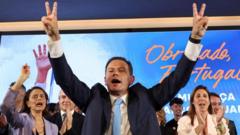The main opposition party, the Socialists, faced a significant setback as their leader, Pedro Nuno Santos, announced his resignation after they finished second. The Socialists experienced a steep decline in seats, putting them in a precarious position against the far-right Chega party, which is gaining momentum in the political landscape. André Ventura, the leader of Chega, deemed this outcome "historic," suggesting that it indicates a shift away from the traditional two-party system in Portugal.
Chega’s campaign prominently addressed issues such as immigration and corruption, gaining traction as both recent elections were sparked by scandals surrounding the incumbent prime minister. Montenegro, acknowledging these challenges, expressed gratitude to his supporters and family, particularly in light of controversies surrounding his political past.
Santos, in his farewell remarks, stated that Montenegro was unfit for the role of prime minister, insisting that the Socialists must continue to address these matters moving forward. As the political landscape shifts in Portugal, the results of the election highlight a growing divide and the rise of new political forces amid ongoing challenges.
Chega’s campaign prominently addressed issues such as immigration and corruption, gaining traction as both recent elections were sparked by scandals surrounding the incumbent prime minister. Montenegro, acknowledging these challenges, expressed gratitude to his supporters and family, particularly in light of controversies surrounding his political past.
Santos, in his farewell remarks, stated that Montenegro was unfit for the role of prime minister, insisting that the Socialists must continue to address these matters moving forward. As the political landscape shifts in Portugal, the results of the election highlight a growing divide and the rise of new political forces amid ongoing challenges.



















